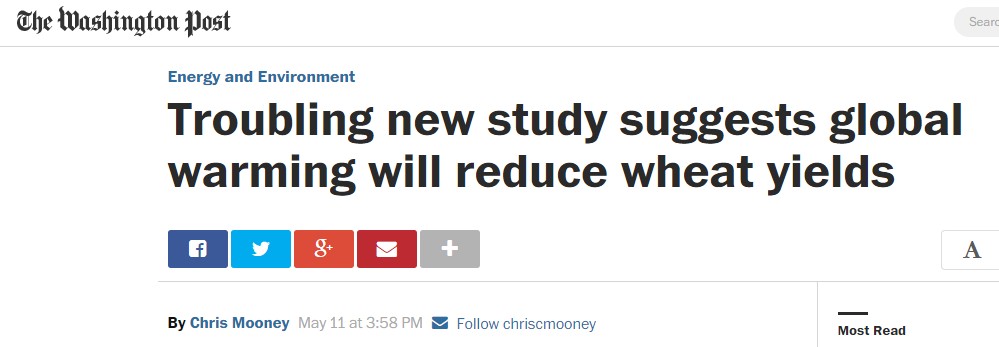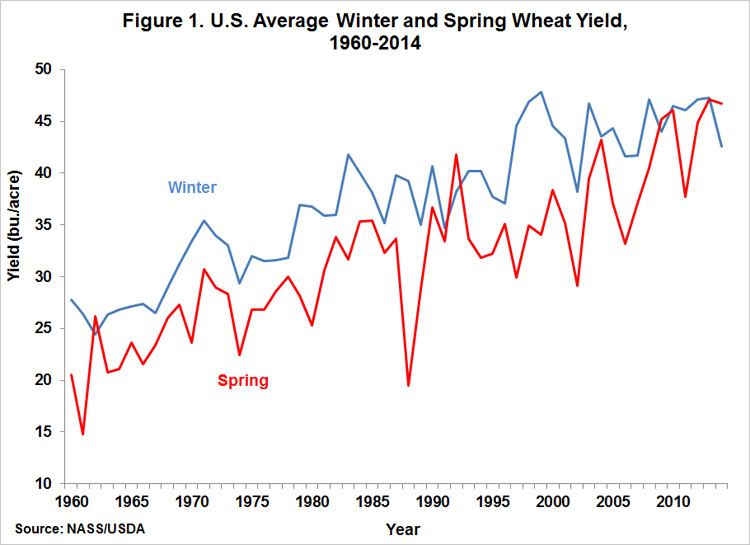a new study in the Proceedings of the National Academy of Sciences is pretty troubling. A warming climate, it suggests, could drive wheat yields in the opposite direction – down — in the United States and, possibly, elsewhere.
Troubling new study suggests global warming will reduce wheat yields – The Washington Post
Wheat yields have been rapidly growing as CO2 has increased. There is not one shred of evidence supporting the assertion of the study.




Since 1998 the amount of land used for agriculture has been decreasing.
So less land is feeding a world population that is increasing at 1.4 million per week.
Here’s the winter wheat yields :
http://www.farmdocdaily.illinois.edu/2012/02/23/fig1.jpg
jlc, your chart looks the same as Tony’s but stops at 2011. What’s your point?
Just the latest in a huge roll-out of climate propaganda papers. Every week there’s 2 or 3 of these to drop straight into compliant medias. Blatant ‘climateering’. A coincidence? Not a chance.
The article is about wheat yields, you have posted a graph of corn yields. It doesn’t matter though, the trend is the same.
http://www.agmanager.info/marketing/outlook/WASDE/default.asp
If you look at the yields for the various grains (by clicking ‘view’ under the html column) you will see everything is quite happy with 400ppm CO2
Corn? Where ?
The chart is right. Now if corn was yielding only 44 bushels per acre, then i would be scared. Globally we haven’t had a wheat crop wreck anywhere in the world for a few years. It would seem that the dryland plants do well in the higher CO2 atmosphere.
Most climate folks would not be able to identify a wheat field and probably think a combine has something to do with football. The should stick to thier virtual world.
http://www.fao.org/english/newsroom/news/2002/7828-en.html
“Globally there will be enough food for a growing world population by the year 2030, but hundreds of millions of people in developing countries will remain hungry and many of the environmental problems caused by agriculture will remain serious, according to the summary report of “World agriculture: towards 2015/2030″, a study launched by the UN Food and Agriculture Organization (FAO).
Population growth will slow down and many people will be better fed. As a result, the growth in demand for food will be lower. The pressure emanating from agriculture on natural resources will continue to increase, but at a slower pace than in the past………….”
They will stop lying when the government stops paying them to lie.
The government will stop paying them to lie when we get a new government.
Regretfully, we have changed governments many times and kept the same private, self-perpetuating group –The US National Academy of Sciences – reviewing budgets of federal research agencies for Congress.
Scientists will stop lying when the US National Academy of Sciences quits directing public research funds to those who lie for hire.
The Geophysics Section of the National Academy of Sciences directs the geo-engineering of Earth and its inhabitants.
The AGU (American Geophysical Union) and the Crafoord Award for geosciences promote geo-engineering of Earth.
I would like to build 3 greenhouses side by side. One with 400 ppm, one with 4,000, and one with 40,000 ppm. See what happens to the wheat plants.
The reason I want to do this is because I’m a scientist, and scientists love to conduct experiments. These morons aren’t scientists at all because they conduct no experiments whatsoever.
No, they just prattle prefabricated propaganda.
CO2Science has a ton of information:
http://www.co2science.org/subject/p/subject_p.php
http://www.co2science.org/subject/c/c4plantphoto.php
Also you might want to look at 250 ppmv, 500 ppmv, 1000 ppmv, 2000 ppmv as well.
http://www.plantphysiol.org/content/155/1/117/F1.medium.gif
Photosynthetic response to CO2 concentration, shown at four temperatures, based on calculations for RuBP regeneration-limited photosynthesis. All rates are expressed relative to the rates at 350 mmol mol–1. Calculations are based on the model of Farquhar et al. (1980) and Farquhar and von Caemmerer (1982) as described by Medlyn et al. (2002).
From: http://www.plantphysiol.org/content/155/1/117.full
Wow. Nice link Gail.
So, wheat is in on the plot to double double the CO2 levels? Ban wheat! >;p
It is called the monopoly rule. Say global warming , go past go and collect $200,000 for the study.
Better yet, say climate change, land on and buy reading railroad after you go past go and collect 200K
Better still say climate disruption, land on an buy boardwalk, collect 200K for going past go, invest it in hotels on park place and boardwalk and have the annual climate change convention in your hotel with everybody flying in and leaving their carbon footprint all over the friendly skies. after which we have to purchase carbon credits to offset their carbon footprint.
After all this time, the word “lie” is insufficient for these repeat offenders! Clearly, it is an act of fraudulence that knows no bounds or limits. And like the USA Wheat production , in Australia, the greatest yields per Acre & multiple records for State Volume, were achieved since the year 2000.
Although our Canadian neighbors to the North might give a hint at what a colder summer might do to crop production.
Geography Type of crop 2011 2012 2013 2014 2015
footnotes
Canada
Barley 2, 10 61.1 54.1 71.7 61.9 ..
Buckwheat 2, 17 .. .. .. .. ..
Canola 2, 22 34.3 28.1 40.0 34.4 ..
Corn for grain 2, 16 142.3 146.8 152.8 149.2 ..
Flaxseed 2, 19 21.8 20.3 27.6 22.2 ..
Mixed grains 2, 15 63.9 63.1 61.5 66.3 ..
Oats 2, 10 76.5 74.9 92.1 83.6 ..
Peas, dry 2, 18 38.2 33.7 44.3 34.9 ..
Rye, all 2, 11, 35 40.1 43.4 40.8 37.7 ..
Rye, fall remaining 2, 13,31 40.1 43.4 40.8 37.7 ..
Rye, spring 2, 14 .. .. .. .. ..
Soybeans 2, 20 42.7 45.0 42.8 40.2 ..
Triticale 2 37.9 43.8 41.6 41.6 ..
Wheat, all 2, 5, 33 44.0 42.6 53.4 46.0 ..
Wheat, durum 2 39.0 36.6 48.4 40.9 ..
Wheat, spring 2, 34 42.8 41.4 53.0 45.7 ..
Wheat, extra strong 2 52.4 46.5 56.8 48.8 ..
Wheat, hard red 2 41.6 40.2 51.0 44.2 ..
Wheat, other spring 2 48.2 38.0 56.5 49.4 ..
Wheat, prairie spring 2 59.8 54.6 66.7 58.3 ..
Wheat, soft white 2 52.0 52.4 66.0 56.2 ..
Wheat, winter
remaining 2, 7, 31 66.3 65.7 70.3 62.9 ..
Wheat, all excluding
durum wheat 2 45.1 44.1 54.6 47.3
http://www5.statcan.gc.ca/cansim/a03?lang=eng&pattern=001-0017&p2=31
An go into ‘add/remove data’, chose ‘Average yield (bushels per acre)’
Plants are like snowbird retired folks, they like the warmth better.
Of particular importance there is the ‘Other Spring” category in 2013 56.8 bu/ac. the All Wheat was a record by 22% over the previous record and Other Spring Wheat is Canada’s biggest crop category. Had to pile in on the ground in some spots and took two years to work through it.
It’s not possible is it, that wheat yields have been improving for decades due to improved farming practice, weed and pest control, seed selection and genetic modification ? The exponents of these practices might argue that it is.
Whenever wheat comes up I am always suspicious that it is a ploy to start bringing in more GM strains, at higher prices. Much research is going in to producing high yield wheat for arid conditions that I can’t help but wonder if the headline “Global warming will decrease wheat yields” isn’t a signal to an industry partner to begin pushing for sales of such a product.
The good news is though, that research is showing some wheat farming techniques reliably sequesters CO2, making wheat a natural CO2 absorber
“We find that integrating improved farming practices (that is, fertilizing crops based on soil tests, reducing summerfallow frequencies and rotating cereals with grain legumes) lowers wheat carbon footprint effectively, averaging ?256?kg CO2 eq?ha?1 per year. For each kg of wheat grain produced, a net 0.027–0.377?kg CO2 eq is sequestered into the soil. With the suite of improved farming practices, wheat takes up more CO2 from the atmosphere than is actually emitted during its production.”
From ‘footprint of spring wheat production’ http://www.nature.com/ncomms/2014/141118/ncomms6012/full/ncomms6012.html
Good news as long as you’re not a coeliac disease sufferer !
GM wheat in production: none. Farmers concerned with wheat’s CO2 ‘footprint’: none.
I really wish people who talk about GMO understood what it is. NDSU can cross-bread varieties to bring a new strain of ‘natural’ wheat but it takes 20 years to isolate the trait they are looking for by the randomness of natural breeding. They could accomplish the same thing in one season with GM.
If/when the world is starving…objections to 150 bushel per acre GMO wheat: none.
I’m stuck on the fence now…maybe I have to believe that wheat yield increases are solely down to CO2 increases….
Increases of 30%-50% yield are attributed to higher minimum temps here http://www.nature.com/nature/journal/v387/n6632/abs/387484a0.html
Umm. Probably not. I recently put a trend anomoly analysis together for corn based on US max temp trend and it had Rsq of 57% to corn yeild. Corn hates heat and corn hates heat at night. Wheat hates heat, but wheat is unaffected by warm nights. I say probably because i have not compared % daily highs in wheat areas to yield. Record wheat crop in canada was cold and wet year. Think of it this way. Bad beach day is good wheat day.
Look at the yields they get in UK or Washington State. Cooler weather makes monster yeilds.
if there is a link to climate change, the wheat plant suggests a cooling trend.
Complete BS. If it really did become warmer, booth the Canadian Prairies and Siberian Steppes could have two whet crops per year and the wheat line to press Northward.
According to this paper the warmth is actually beneficial…but increased sunlight could be an issue, because excessive sun triggers a protective mechanism within the plant which itself strongly reduces CO2 uptake
http://jxb.oxfordjournals.org/content/62/2/453.full.pdf
Have you been to canada? Have you walked a wheat field? Have you counted spikelets? Summer in canada is sunlight from 5am to 11pm. wheat does just fine.
Heat on a wheat plant reduces yield and increases protien content.
As soon as I saw the author of the Post’s article, Chris Mooney, I knew there was an urgent need to put my hip boots on due to the inevitable flood of BS to follow. This clown is as bad as Seth Borenstein.